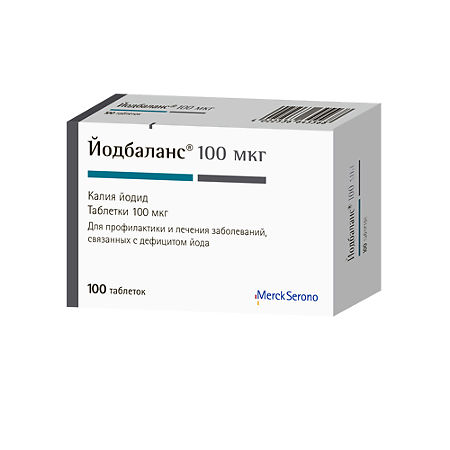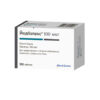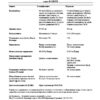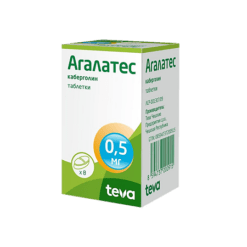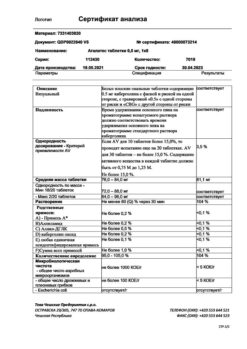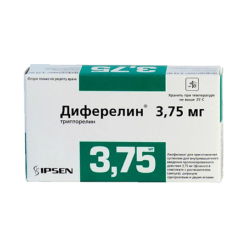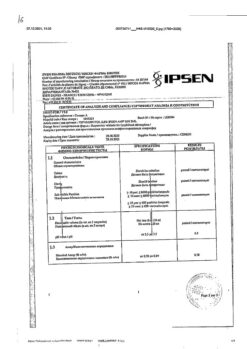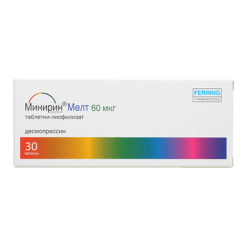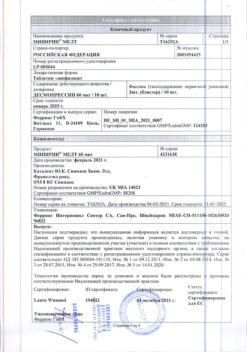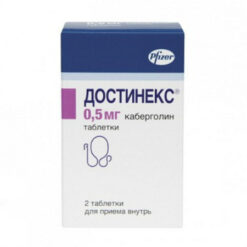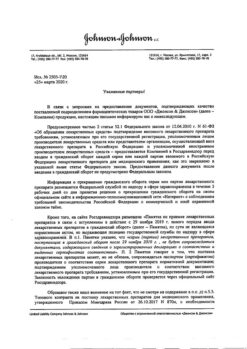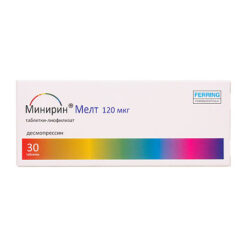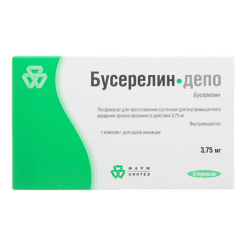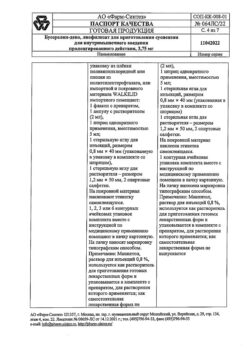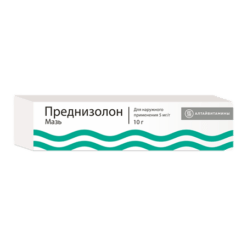No products in the cart.
Iodobalance, tablets 100 mcg 100 pcs
€3.44 €3.05
Description
Iodine is a vital trace element. Without iodine normal functioning of the thyroid gland is impossible because it is an integral part of thyroxine and triiodothyronine.
The thyroid hormones are involved in the development of all organs and systems, in the regulation of metabolic processes in the body: protein, fat, carbohydrate and energy, they also regulate the activity of the brain, nervous system and CSS, mammary glands, growth and development of children, the formation of their intellectual abilities. Iodine deficiency is especially dangerous for children, adolescents, pregnant and lactating women.
Iodobalance®, a source of iodine, fills its shortage in the body, prevents the development of iodine deficiency diseases, prevents the development of goitre associated with iodine deficiency in food; normalizes the size of the thyroid gland in newborns, children, adolescents and adults.
Pharmacokinetics
When taken orally, the drug is almost completely absorbed in the small intestine. The average Vd for healthy people is approximately 23 liters (38% of body weight).
The concentration of iodine in plasma is normally 0.001-0.005 mcg/ml. It accumulates in the thyroid gland, salivary glands, mammary glands and gastric tissues. Concentrations in saliva, gastric juice and breast milk are about 30 times higher than in blood plasma. Excreted in the urine, the concentration of iodine in the urine relative to creatinine (µg/g) is an indicator of its intake.
Indications
Indications
Prevention of iodine deficiency diseases, incl. endemic goiter (especially in pregnant and lactating women);
prevention of goiter recurrence after its surgical removal or after completion of goiter treatment with thyroid hormone preparations;
treatment of diffuse euthyroid goiter in newborns, children, adolescents and young adult patients.
prevention of goiter relapse during complex treatment with thyroid hormone preparations.
Pharmacological effect
Pharmacological effect
Iodine is one of the vital microelements. Without iodine, normal functioning of the thyroid gland is impossible, because it is a component of thyroxine and triiodothyronine.
Thyroid hormones are involved in the development of all organs and systems, in the regulation of metabolic processes in the body: protein, fat, carbohydrate and energy; they also regulate the activity of the brain, nervous system and cardiovascular system, reproductive and mammary glands, the growth and development of the child, the formation of his intellectual abilities. Iodine deficiency is especially dangerous for children, adolescents, pregnant and lactating women.
Iodine balance®, being a source of iodine, replenishes its deficiency in the body, prevents the development of iodine deficiency diseases, and prevents the development of goiter associated with a lack of iodine in food; normalizes the size of the thyroid gland in newborns, children, adolescents and adults.
Pharmacokinetics
When taken orally, the drug is almost completely absorbed in the small intestine. The average Vd for healthy people is approximately 23 L (38% of body weight).
The normal iodine concentration in blood plasma is 0.001–0.005 mcg/ml. Accumulates in the thyroid gland, salivary glands, mammary glands and stomach tissues. The concentration in saliva, gastric juice and breast milk is approximately 30 times higher than in blood plasma. It is excreted in the urine; the concentration of iodine in urine relative to creatinine (µg/g) is an indicator of its intake into the body.
Special instructions
Special instructions
It should be taken into account that during drug therapy in patients with renal failure, hyperkalemia may develop.
Before starting therapy, it is necessary to exclude the presence of hyperthyroidism or nodular toxic goiter in the patient, as well as a history of these diseases.
If there is a predisposition to autoimmune thyroid diseases, the formation of antibodies to thyroid peroxidase is possible.
Saturation of the thyroid gland with iodine can prevent the accumulation of radioactive iodine used for therapeutic or diagnostic purposes. In this regard, it is not recommended to take the drug before carrying out activities using radioactive iodine.
Impact on the ability to drive vehicles and operate machinery
Iodine balance does not affect the ability to drive vehicles or operate machinery.
Active ingredient
Active ingredient
Potassium iodide
Composition
Composition
1 tablet of potassium iodide 130.8 mcg, which corresponds to the iodine content of 100 mcg
Excipients:
magnesium stearate,
microcrystalline cellulose,
colloidal silicon dioxide,
corn starch,
cellulose powder,
lactose monohydrate.
Pregnancy
Pregnancy
During pregnancy and breastfeeding, the need for iodine increases, so it is especially important to use Iodine Balance in sufficient doses to ensure adequate iodine intake into the body (iodine intake should not be
It should be borne in mind that the drug in high doses (> 1000 mcg/day) penetrates well through the placental barrier and can cause the development of hypothyroidism and goiter in the fetus. Iodine is also excreted in breast milk. Therefore, the use of the drug during pregnancy and breastfeeding is possible only in recommended doses.
Contraindications
Contraindications
Severe thyrotoxicosis.
Latent thyrotoxicosis (when used in doses >150 mcg/day).
Dühring’s dermatitis herpetiformis.
Toxic adenoma, nodular goiter when used in doses >300 mcg/day (with the exception of preoperative therapy to block the thyroid gland).
Hypersensitivity to iodine.
Hives.
Hypothyroidism (except in cases where the development of the latter is caused by severe iodine deficiency).
With caution:
During therapy with radioactive iodine.
If you have or suspect thyroid cancer.
Side Effects
Side Effects
With the prophylactic use of Iodine Balance, as well as with therapeutic use in newborns, children and adolescents, as a rule, no side effects are observed.
Allergic reactions
Sometimes – skin rash, Quincke’s edema.
Interaction
Interaction
The effectiveness of treatment with antithyroid drugs while taking iodine is reduced.
Potassium perchlorate inhibits iodine absorption by the thyroid gland.
Taking high doses of iodine and simultaneous administration of potassium-sparing diuretics can lead to the development of hyperkalemia.
The simultaneous administration of iodine in high doses with lithium preparations contributes to the development of goiter and hypothyroidism.
The uptake of iodine by the thyroid gland and its metabolism are stimulated by TSH.
Overdose
Overdose
Symptoms: when the drug is prescribed at a dose of more than 150 mcg/day in patients who have foci of functional autonomy in the thyroid gland, the development of iodine-induced hyperthyroidism is possible.
When treated with iodine preparations in very high doses (>1000 mcg/day), iodine-induced goiter and hypothyroidism may develop in some cases.
Chronic overdose can lead to the development of iodism – a metallic taste in the mouth, swelling and inflammation of the mucous membranes (rhinitis, conjunctivitis, gastroenteritis, bronchitis), acne, dermatitis, swelling of the salivary glands, fever, irritability.
Treatment: in case of chronic overdose, it is recommended to stop using the drug. If iodine-induced hyperthyroidism develops, it is recommended to stop using the drug and prescribe therapy with antithyroid drugs. In particularly severe cases, intensive therapy, plasma exchange or thyroidectomy is necessary. If hypothyroidism develops, it is recommended to stop using the drug and prescribe therapy with iodine-containing thyroid hormones.
Storage conditions
Storage conditions
The drug should be stored out of the reach of children, protected from light at a temperature not exceeding 30°C.
Shelf life
Shelf life
3 years.
Manufacturer
Manufacturer
Merck Healthcare KGaA, Germany
Additional information
| Shelf life | 3 years. |
|---|---|
| Conditions of storage | The drug should be kept out of reach of children, protected from light at a temperature not exceeding 30 ° C. |
| Manufacturer | Merck Healthcare KGaA, Germany |
| Medication form | pills |
| Brand | Merck Healthcare KGaA |
Related products
Buy Iodobalance, tablets 100 mcg 100 pcs with delivery to USA, UK, Europe and over 120 other countries.

